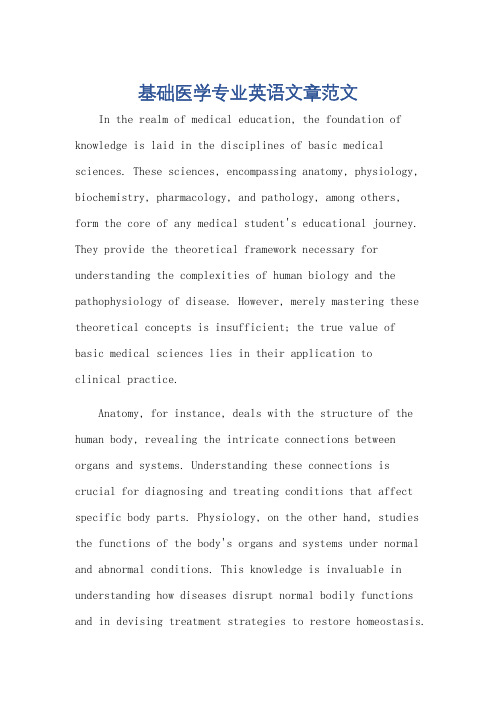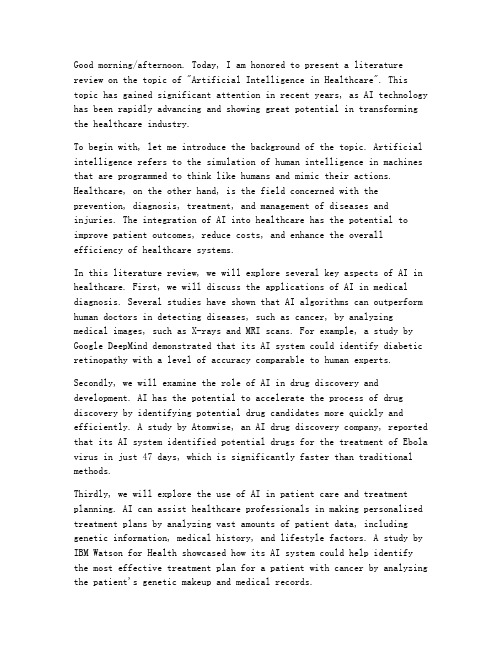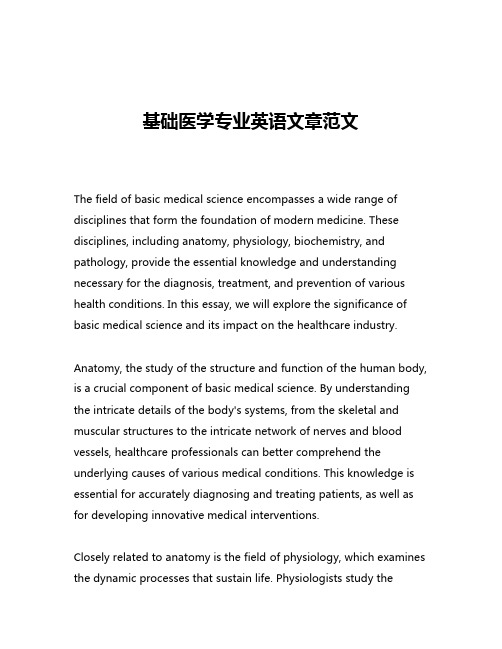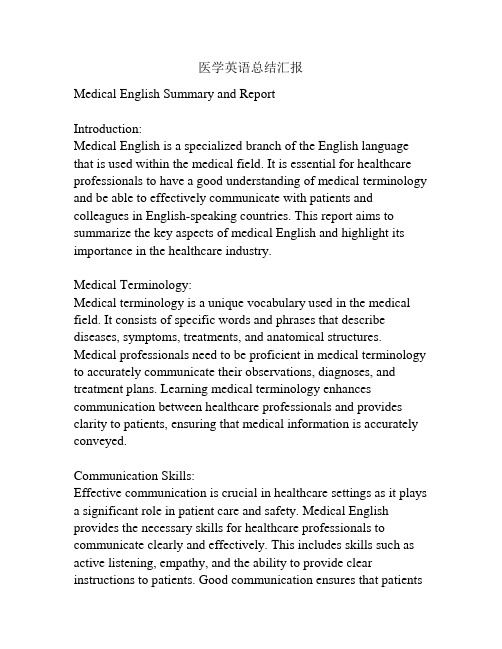英文文献汇报_基础医学_医药卫生_专业资料
医学英文文献汇报

研究方法与实验 设计
文献评价与展望
作者及发表时间
作者:文章的主要负责人或团队名称
发表时间:文章在学术期刊上发表的 具体时间
ቤተ መጻሕፍቲ ባይዱ
文献来源及类型
文献来源:PubMed、Google Scholar等学术搜索引擎 文献类型:学术论文、综述、病例报告等 文献筛选标准:相关性、学术质量、作者声誉等 文献整理:按照主题、研究领域等分类整理
研究目的和背景
文献研究目的:解决特定医学问题或验证假设 文献研究背景:当前医学领域的热点问题或未解决的问题 文献研究意义:为医学领域的发展提供新的思路或证据 文献研究局限性:文献研究的不足之处和需要进一步研究的问题
研究方法
实验设计:具体 描述实验对象、 实验操作和实验 结果分析的方法
数据分析:说明 数据分析的方法 和过程,包括统 计学方法等
注重文献汇报技 巧,提高表达能 力
结合实际工作, 将文献研究成果 应用于临床实践
加强团队协作, 共同推进医学研 究进展
文献综述:说明 文献综述的方法 和过程,如何筛 选和评价文献
研究创新点:介 绍研究方法的创 新点和独特之处
实验设计
实验对象:选择合适的动物 或细胞模型
实验目的:明确研究的主要 问题或假设
实验方法:描述实验过程和 操作步骤
实验结果:记录和分析实验 数据
数据收集与分析
收集方法:采用问卷调查、访谈、观察等方法 分析方法:采用统计分析、内容分析等方法 数据分析软件:SPSS、Excel等 数据分析流程:数据清洗、整理、描述性分析、推断性分析等
结论:总结研究结果和讨论, 强调研究的重要性和意义
结论与意义
英文医学文献

英文医学文献全文共四篇示例,供读者参考第一篇示例:Medical literature in English is a vast and diverse field that encompasses a wide range of topics, from basic biomedical research to clinical trials and case studies. It plays a crucial role in the advancement of medical knowledge and the improvement of patient care worldwide.Another challenge of English medical literature is the potential for bias and misinformation. Not all research studies are of equal quality, and it is important for healthcare professionals to critically evaluate the evidence presented in medical literature before applying it to patient care. Thepeer-review process, in which research articles are reviewed by experts in the field before publication, helps to ensure the quality and reliability of medical literature. However, it is still crucial for healthcare professionals to approach medical literature with a critical eye and a thorough understanding of research methods and study design.第二篇示例:Medical literature in English is an essential component of the global healthcare system. It provides valuable information and research findings that help medical professionals stay current with the latest advancements in the field. English language medical literature covers a wide range of topics, including clinical research, case studies, reviews, and guidelines for treatment.第三篇示例:Medical literature refers to the body of scholarly publications and research articles that focus on the field of medicine. These articles are written by healthcare professionals, researchers, and experts in various medical specialties. They are essential for advancing medical knowledge, disseminating new discoveries, and improving patient care.第四篇示例:Medical literature in English plays a crucial role in the field of healthcare and medical research. It serves as a valuable resource for healthcare professionals, researchers, and students around the world, providing up-to-date information on a wide range of medical topics. In this article, we will explore the importance of English medical literature, its benefits, and how it contributes to advancements in the field of medicine.Importance of English Medical Literature。
基础医学专业英语文章范文

基础医学专业英语文章范文In the realm of medical education, the foundation of knowledge is laid in the disciplines of basic medical sciences. These sciences, encompassing anatomy, physiology, biochemistry, pharmacology, and pathology, among others, form the core of any medical student's educational journey. They provide the theoretical framework necessary for understanding the complexities of human biology and the pathophysiology of disease. However, merely mastering these theoretical concepts is insufficient; the true value of basic medical sciences lies in their application toclinical practice.Anatomy, for instance, deals with the structure of the human body, revealing the intricate connections between organs and systems. Understanding these connections is crucial for diagnosing and treating conditions that affect specific body parts. Physiology, on the other hand, studies the functions of the body's organs and systems under normal and abnormal conditions. This knowledge is invaluable in understanding how diseases disrupt normal bodily functions and in devising treatment strategies to restore homeostasis.Biochemistry explores the chemical reactions that occur within the body at a molecular level. It is fundamental to understanding the biochemical processes that underlie many diseases, such as diabetes and cardiovascular disease. Pharmacology, meanwhile, focuses on the study of drugs and their interactions with the body. This discipline iscrucial in selecting the most appropriate medications for patients, taking into account their specific conditions and the potential side effects of various drugs.Pathology, which deals with the study of disease processes, bridges the gap between basic medical sciences and clinical medicine. It provides insights into the cellular and molecular changes that occur during disease development, informing diagnostic procedures and treatment plans.The integration of basic medical sciences into clinical practice is essential for effective patient care. Physicians must draw upon their knowledge of anatomy, physiology, biochemistry, pharmacology, and pathology to make accurate diagnoses and prescribe effective treatments. For instance, a patient presenting with symptoms of heartdisease would require a physician who is familiar with the anatomy and physiology of the cardiovascular system, as well as the pharmacology of the various drugs used to treat heart disease.In addition to their role in patient care, basic medical sciences also play a crucial role in medical research. By understanding the fundamental mechanisms of disease, researchers are able to develop new therapies and interventions that target the underlying causes of disease, rather than just the symptoms. This approach has led to significant advances in areas such as genetics, immunology, and cancer research.In conclusion, the basic medical sciences serve as the foundation of medical education and practice. They provide the theoretical knowledge necessary for understanding human biology and the pathophysiology of disease, and they serve as the toolbox for clinicians in diagnosing and treating patients. The integration of these sciences into clinical practice is essential for effective patient care, and their role in medical research continues to drive progress in the field of medicine.**基础医学:理论与实践的桥梁**在医学教育领域,知识的基础建立在基础医学学科之上。
文献汇报英文发言稿范文

Good morning/afternoon. Today, I am honored to present a literature review on the topic of "Artificial Intelligence in Healthcare". This topic has gained significant attention in recent years, as AI technology has been rapidly advancing and showing great potential in transforming the healthcare industry.To begin with, let me introduce the background of the topic. Artificial intelligence refers to the simulation of human intelligence in machines that are programmed to think like humans and mimic their actions. Healthcare, on the other hand, is the field concerned with the prevention, diagnosis, treatment, and management of diseases and injuries. The integration of AI into healthcare has the potential to improve patient outcomes, reduce costs, and enhance the overall efficiency of healthcare systems.In this literature review, we will explore several key aspects of AI in healthcare. First, we will discuss the applications of AI in medical diagnosis. Several studies have shown that AI algorithms can outperform human doctors in detecting diseases, such as cancer, by analyzing medical images, such as X-rays and MRI scans. For example, a study by Google DeepMind demonstrated that its AI system could identify diabetic retinopathy with a level of accuracy comparable to human experts.Secondly, we will examine the role of AI in drug discovery and development. AI has the potential to accelerate the process of drug discovery by identifying potential drug candidates more quickly and efficiently. A study by Atomwise, an AI drug discovery company, reported that its AI system identified potential drugs for the treatment of Ebola virus in just 47 days, which is significantly faster than traditional methods.Thirdly, we will explore the use of AI in patient care and treatment planning. AI can assist healthcare professionals in making personalized treatment plans by analyzing vast amounts of patient data, including genetic information, medical history, and lifestyle factors. A study by IBM Watson for Health showcased how its AI system could help identify the most effective treatment plan for a patient with cancer by analyzing the patient's genetic makeup and medical records.Moreover, we will discuss the ethical considerations associated with the use of AI in healthcare. One of the primary concerns is the potentialfor bias in AI algorithms, which could lead to unequal treatment of patients based on race, gender, or socioeconomic status. Another concern is the privacy of patient data, as AI systems require access tosensitive information. Researchers are actively working on addressing these concerns by developing fair and transparent AI algorithms and implementing robust data protection measures.In conclusion, the literature review on the topic of "Artificial Intelligence in Healthcare" highlights the significant potential of AI technology in transforming the healthcare industry. By improving medical diagnosis, accelerating drug discovery, and enhancing patient care, AI can play a crucial role in improving patient outcomes and reducing healthcare costs. However, it is essential to address the ethical concerns associated with AI in healthcare to ensure that it is used responsibly and for the benefit of all patients.Thank you for your attention, and I am now open to any questions or comments you may have.。
cochrane纳入的RCT文献质量评价英文原版

If particular questions/entries were pre-specified in the review’s protocol, responses should be provided for each question/entry.
Bias due to problems not covered elsewhere in the table.
Domain
Support for judgement
Review authors’ judgement
Selection bias.
Random sequence generation.
Describe the method used to generate the allocation sequence in sufficient detail to allow an assessment of whether it should produce comparable groups.
Detection bias due to knowledge of the allocated interventions by outcome assessors.
Attrition bias.
基础医学专业英语文章范文

基础医学专业英语文章范文The field of basic medical science encompasses a wide range of disciplines that form the foundation of modern medicine. These disciplines, including anatomy, physiology, biochemistry, and pathology, provide the essential knowledge and understanding necessary for the diagnosis, treatment, and prevention of various health conditions. In this essay, we will explore the significance of basic medical science and its impact on the healthcare industry.Anatomy, the study of the structure and function of the human body, is a crucial component of basic medical science. By understanding the intricate details of the body's systems, from the skeletal and muscular structures to the intricate network of nerves and blood vessels, healthcare professionals can better comprehend the underlying causes of various medical conditions. This knowledge is essential for accurately diagnosing and treating patients, as well as for developing innovative medical interventions.Closely related to anatomy is the field of physiology, which examines the dynamic processes that sustain life. Physiologists study themechanisms by which the body's systems, such as the cardiovascular, respiratory, and digestive systems, function in a coordinated manner to maintain homeostasis. This understanding is vital for identifying and addressing disruptions in these systems, which can lead to the development of various diseases.Biochemistry, on the other hand, focuses on the chemical processes that occur within living organisms. By studying the complex interactions between molecules, enzymes, and other biomolecules, biochemists can elucidate the fundamental mechanisms underlying biological processes. This knowledge is essential for understanding the etiology of diseases, as well as for developing targeted pharmacological interventions.Pathology, the study of the underlying causes and effects of diseases, is another crucial component of basic medical science. Pathologists employ a range of techniques, including microscopic examination of tissues and analysis of biological samples, to identify the cellular and molecular changes that occur in diseased states. This information is crucial for accurate diagnosis, prognosis, and the development of effective treatment strategies.The importance of basic medical science cannot be overstated, as it provides the foundation for the entire healthcare industry. Healthcare professionals, such as physicians, nurses, and medicalresearchers, rely on the knowledge and insights gained from these disciplines to make informed decisions and provide the best possible care for their patients.Moreover, the advancement of basic medical science has led to numerous breakthroughs in the field of medicine. From the development of lifesaving vaccines and medications to the implementation of innovative surgical techniques, the contributions of basic medical science have been instrumental in improving the overall health and well-being of individuals worldwide.In recent years, the field of basic medical science has also seen a growing emphasis on interdisciplinary collaboration. Researchers from various fields, such as biology, chemistry, and engineering, are working together to tackle complex healthcare challenges. This collaborative approach has led to the emergence of new and exciting areas of study, such as regenerative medicine, personalized healthcare, and precision diagnostics.As the healthcare industry continues to evolve, the importance of basic medical science will only become more pronounced. With the ever-increasing demand for more effective and efficient healthcare solutions, the knowledge and insights gained from these foundational disciplines will be crucial in shaping the future of medicine.In conclusion, basic medical science is the bedrock upon which the entire healthcare industry is built. By providing a deep understanding of the human body, its functions, and the underlying causes of disease, these disciplines have paved the way for countless advancements in the field of medicine. As we move forward, the continued advancement and application of basic medical science will be essential for improving the health and well-being of individuals around the world.。
医学英语总结汇报

医学英语总结汇报Medical English Summary and ReportIntroduction:Medical English is a specialized branch of the English language that is used within the medical field. It is essential for healthcare professionals to have a good understanding of medical terminology and be able to effectively communicate with patients and colleagues in English-speaking countries. This report aims to summarize the key aspects of medical English and highlight its importance in the healthcare industry.Medical Terminology:Medical terminology is a unique vocabulary used in the medical field. It consists of specific words and phrases that describe diseases, symptoms, treatments, and anatomical structures. Medical professionals need to be proficient in medical terminology to accurately communicate their observations, diagnoses, and treatment plans. Learning medical terminology enhances communication between healthcare professionals and provides clarity to patients, ensuring that medical information is accurately conveyed.Communication Skills:Effective communication is crucial in healthcare settings as it plays a significant role in patient care and safety. Medical English provides the necessary skills for healthcare professionals to communicate clearly and effectively. This includes skills such as active listening, empathy, and the ability to provide clear instructions to patients. Good communication ensures that patientsfeel heard, understood, and involved in their own care, leading to better health outcomes.Medical Writing:Medical writing involves the creation of various documents, such as medical reports, research papers, and patient records. These documents must be written accurately and concisely to convey medical information effectively. Medical English provides the necessary knowledge and skills to write in a clear, professional manner. This ensures that medical information is documented accurately and can be easily understood by other healthcare professionals.International Collaboration:The field of medicine has become increasingly globalized, with healthcare professionals collaborating across borders. Medical English facilitates international collaboration by providing a standardized language for communication. Healthcare professionals from different countries can effectively communicate and share medical knowledge, leading to improved patient care worldwide.Skills for Medical Professionals:Proficiency in medical English is a critical skill for healthcare professionals. It allows them to effectively communicate with patients from diverse linguistic backgrounds. Medical English also helps healthcare professionals stay updated with the latest medical research and literature, enabling them to provide evidence-based care. Additionally, proficiency in medical English is often required for professionals seeking to work in English-speaking countries orto pursue higher education in medicine.Conclusion:In conclusion, medical English plays a vital role in the healthcare industry. It provides healthcare professionals with the necessary skills to communicate effectively with patients and colleagues. Proficiency in medical terminology and writing ensures accurate and concise communication of medical information. Furthermore, medical English facilitates international collaboration and enhances the professional development of medical professionals. With the increasing globalization of healthcare, proficiency in medical English is becoming an essential skill for healthcare professionals worldwide.。
医药学类文献双语版:汉译英

介导性shRNA能抑制肺癌细胞中livin沉默基因的表达从而促进SGC-7901细胞凋亡背景—由于肿瘤细胞抑制凋亡增殖,特定凋亡的抑制因素会对于发展新的治疗策略提供一个合理途径。
Livin是一种凋亡抑制蛋白家族成员,在多种恶性肿瘤的表达中具有意义。
但是, 在有关胃癌方面没有可利用的数据。
在本研究中,我们发现livin基因在人类胃癌中的表达并调查了介导的shRNA能抑制肺癌细胞中livin沉默基因的表达,从而促进SGC-7901细胞凋亡。
方法—mRNA及蛋白质livin基因的表达用逆转录聚合酶链反应技术及西方吸干化验进行了分析。
小干扰RNA真核表达载体具体到livin基因采用基因重组、测序核酸。
然后用Lipofectamin2000转染进入SGC-7901细胞。
逆转录聚合酶链反应技术和西方吸干化验用来验证的livin基因在SGC-7901细胞中使沉默基因生效。
所得到的稳定的复制品用G418来筛选。
细胞凋亡用应用流式细胞仪(FCM)来评估。
细胞生长状态和5-FU的50%抑制浓度(IC50)和顺铂都由MTT比色法来决定。
结果—livin mRNA和蛋白质的表达检测40例中有19例(47.5%)有胃癌和SGC-7901细胞。
没有livin基因表达的是在肿瘤邻近组织和良性胃溃疡病灶。
相关发现在livin基因的表达和肿瘤的微小分化和淋巴结转移一样(P < 0.05)。
4个小干扰RNA真核表达矢量具体到基因重组的livin基因建立。
其中之一,能有效地减少livin基因的表达,抑制基因不少于70%(P < 0.01)。
重组的质粒被提取和转染到胃癌细胞。
G418筛选所得到的稳定的复制品被放大讲究。
当livin基因沉默,胃癌细胞的生殖活动明显低于对照组(P < 0.05)。
研究还表明,IC50上的5-Fu和顺铂在胃癌细胞的治疗上是通过shRNA减少以及刺激这些细胞(5-Fu proapoptotic和顺铂)(P < 0.01)。
